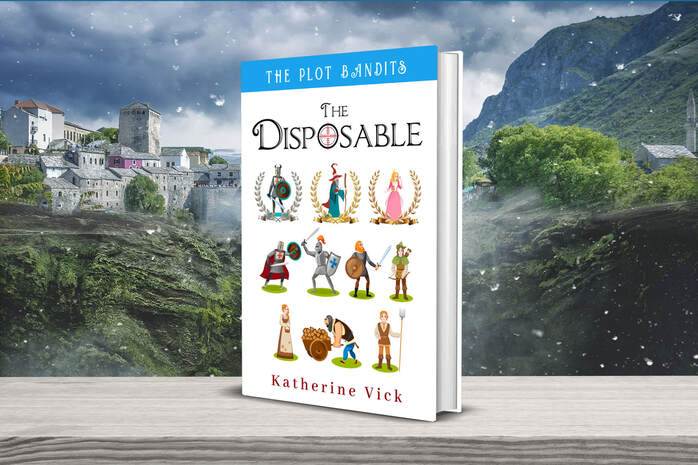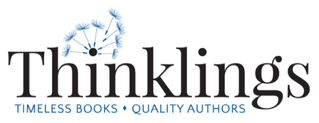|
Every time we release a book, we’ll post an interview with its author during the month before the book is published. Our next book comes out on April 1st, appropriately, because it's a comedy! The Disposable is a hilarious parody of epic quest novels, and we are interviewing Katherine Vick, our first UK author! When did you know that you wanted to be a writer? I reckon pretty much since I knew it was a thing you were allowed to do. From my toddler years, my mum testifies that I was making up stories and games for my toys every waking hour. I started to write them down as soon as I could write and haven’t ever stopped since. I was—and still am—always happiest when playing about with my imagination and bringing it to life. And when it dawned on me that there were people out there whose job it was to write my reading material—that was it really. I knew what I wanted to do. Where did you get the inspiration for The Disposable? I suspect it was born out of my natural cynicism. While I absolutely love and have nothing but affection for the fantasy genre, there were certain aspects of it that the cynic in me could never quite let pass. And then when I went on to university to do my Masters, I opted to take the creative writing route for my dissertation and got assailed by the idea of a character trying to take control of their story away from the author (an experience most writers know well!). The piece and analysis I wrote based on that was, although with a different character, the first blast of the creation of Fodder. And that led me to wonder if, with some tweaks, there might be a novel in that idea.... What have been your main obstacles to getting published? Honestly? Partly publishers and agents and partly myself. At the time I was trying to get The Disposable out and about, the publishing world seemed to be stuck in a rut—every agent’s page and publishing company website seemed to press home that they didn’t want fantasy and if they did, they didn’t want anything original or new, just things that were along the same lines as currently successful books, but just different enough. And then, I got so tired of either replies saying “really well written, just not for us” or no reply at all, that I rather lost heart and stopped trying for a few years. Having the hope constantly snatched away was too depressing. Who is your biggest writing inspiration? It’s hard to say really. I adored the late Terry Pratchett but I came to his work over a decade after I started putting words to paper (keyboards came later) so I’m not sure he inspired me exactly, just gave me something to aspire to. And though inspire isn’t quite the right word, I will always be deeply grateful to my best friend, Kerry, for her support as a proofreader and sounding board for my assorted nonsense over the years. Tell us one weird, interesting tidbit about yourself. I have been slightly published before in a book called Afterliff by John Lloyd and Jon Canter, a follow-up to the wonderful The Meaning of Liff by Douglas Adams and John Lloyd. The basic premise of the original was to take place names uselessly hanging around on signposts and use them to create words for things that should have words for them but don’t. I loved this and had for many years been making up my own (several of which are in regular use amongst my family) and when a friend told me they were doing a new version and asking for public submissions, how could I resist? I submitted a selection and four were chosen and included. They are Mockerkin, Sticklepath, Huish, and Gussage All Saints. And yes, for those who have read it, I was on an outdoors holiday when they came to mind. How could you tell? What does your writing space look like? It looks like a small spare room containing a desk and as many bookshelves and folders as I could physically cram in, along with great piles of camping gear that have nowhere else to live. I can see trees, birds, and mad squirrels out the window. I like that. I need somewhere nice to gaze with a furrowed brow when I’m stuck. How long have you been writing this book? Well, I wrote it quite a while back, as it happens. Certainly the idea had been knocking around since I wrote my Masters dissertation and I started thinking about it in the couple of years after that, jotting down rough notes initially and then formally planning it from about 2006/7 before starting writing in 2008. I finished what is now the first book, originally named Fodder but now called The Disposable, about a year or so later—I’d planned it as a single novel originally but realised it was going to be too much and split it out as it grew, first to two books and then a trilogy. The yet-to-be-published remainder I rounded off—after much to-ing and fro-ing and alteration—in about 2014. Which character in your book do you identify most with? Oddly enough, in their different ways, I identify with all of my main five characters. It dawned on me a while back that all of my lead players, in a manner that would probably result in a psychologist having a field day, reflect particular aspects of my own personality. Flirt, for example, represents my practical, organisational side, the part of me that likes to get on with things and sort stuff out. Shoulders, as anyone who knows me will testify, represents my anxiety and persistent, if unintentional, tendency to seek out the downside in every up and the problem in every solution and to worry about them incessantly. Dullard stands for my intellectual, curious streak, the bit of me that wants to understand the world and how it works and, when he remembers, my diffidence. Pleasance is definitely my temper, but also, in her own special way, my insecurity and self-doubt (believe it or not!). And Fodder? He is the embodiment of my sense of fairness and justice and how important I feel those things are and should be in life. I shall await the results of the psychological assessments based on this with interest! As an Amazon Associate, we earn from qualifying purchases
0 Comments
Your comment will be posted after it is approved.
Leave a Reply. |
Archives
July 2024
Categories
All
|
As an Amazon Associate, we earn from qualifying purchases.

 RSS Feed
RSS Feed
